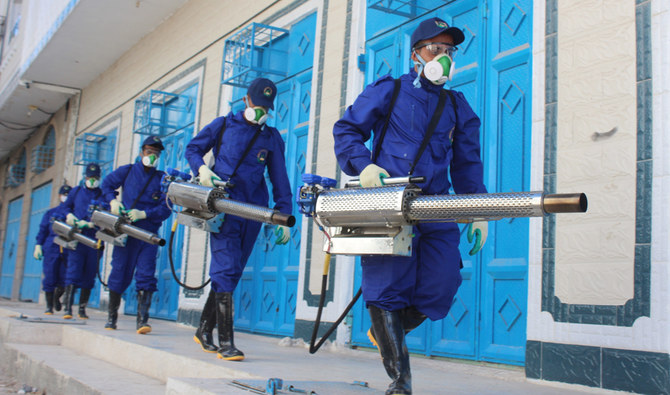AL-MUKALLA: Yemen recorded more cases of coronavirus disease (COVID-19) on Saturday, bringing the total number of confirmed cases to nine with a death toll of two amid renewed calls for a humanitarian truce.
Two more cases were reported in the southern port city of Aden and one in Taiz, the country’s national emergency coronavirus committee said in a Facebook post.
The detection of new cases in Taiz has stoked fears about the rapid spread of the disease in a city that has seen the fiercest battles between the Iran-backed Houthis and the internationally recognized government, and which has been under a Houthi siege since early 2015. Fighting and the siege have destroyed the city’s health system, local officials say.
Yemeni President Abed Rabbo Mansour Hadi on Saturday called Taiz Gov. Nabil Shamsan to discuss new measures and efforts to confront the spread of coronavirus. State news agency Saba reported that Hadi instructed the Health Ministry to urgently send medical supplies and medical teams to the city.
Local authorities had previously shut the city down, banning religious gatherings inside and outside mosques during Ramadan, closing markets and restricting residents’ movements between districts.
HIGHLIGHTS
• Two cases have been reported in Aden and one in Taiz.
• Fighting continues to rage across Yemen, as government forces announced killing a number of Houthi field commanders.
Local officials and residents have warned the governor against shutting the city’s only entry point that is under government control, saying the disruption of vital food and medical supplies would exacerbate the humanitarian situation in the city and push its 4.5 million population toward famine.
“The closure of the city’s borders would cause a famine,” Najeb Qahatan, director of the local Ministry of Information office, told Arab News. “You would address one pandemic and then would create another.”
The Houthis imposed the siege after failing to seize control of the city’s downtown area. Local and international rights organizations have criticized the militia for blocking aid and food supplies and for pushing residents into bringing in those supplies by camels along dangerous roads.
Government forces, backed by Arab coalition warplanes, managed to partially break the siege in 2016 after expelling the Houthis from a road linking the city with Aden.
“Closing the city’s only crossing with Aden would create economic and health problems. The only solution is opening the crossing and intensifying the testing of people who cross into the city,” Qahatan said.
Health officials complain that they cannot test the hundreds of people who enter the city daily from Aden, which has the highest number of coronavirus cases in Yemen, because there is a severe shortage of testing kits and protective equipment.
Army troops were ordered to stay in their barracks for two weeks on Taiz’ battlefields before going back to their families. Military reinforcements will be disinfected before dispatching them to the battlefield, Yemeni army spokesman Abdul Basit Al-Baher said.
“Those measures are aimed at preventing the spread of diseases in the army,” he told Arab News, adding that the detection of new coronavirus cases in Taiz had made lifting the siege an even more urgent matter. “We want the siege to be lifted before stopping the war. The siege has caused more harm to the city than shelling or fighting.”
Yemeni politicians and human rights activists have renewed their calls for a humanitarian truce amid the global health emergency.
“A comprehensive cease-fire in Yemen and the release of all detainees, prisoners and abductees are humanitarian necessities and duties in order to devote efforts to protect the Yemeni people from the potential coronavirus pandemic,” Yemen’s former deputy prime minister, Abdulmalik Al-Mekhlafi, tweeted.
Fighting continues to rage across Yemen, as government forces announced killing a number of Houthi field commanders and making territorial gains in Dhale, Al-Bayda and Marib’s Serwah.






















